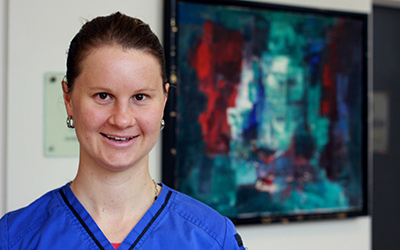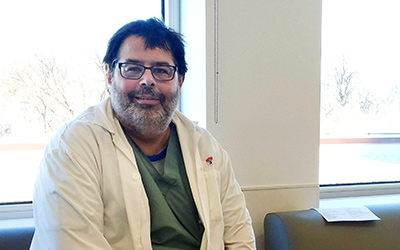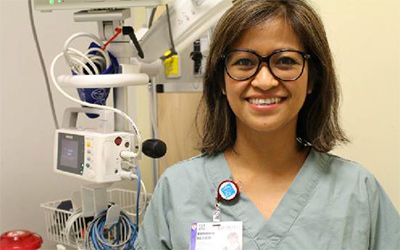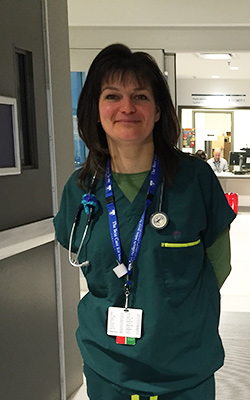Nursing Week - Discover the work of MUHC nurses
During National Nursing Week, which runs from May 9 to 15 this year, we recognize their professionalism, dedication and passion. Profiled here are a few of our dedicated and compassionate nurses who work around the clock to ensure our patients and families receive the best care possible.
Joanie Pinard, night shift nurse in the Emergency Department of the Montreal General Hospital

Working the night shift in the Trauma Centre of downtown Montreal means one thing to Joanie Picard: being able to act as quickly and efficiently as possible in order to ensure patients’ recovery.
“When the paramedics call to inform us they are bringing in a trauma victim we prepare ourselves in the trauma bay. The adrenaline is usually high,” says Joanie. “The more severe the injuries, the more we know our quick actions can make a real difference.”
However, being an ED nurse not only means caring for the severely injured. As part of her nursing job, Joanie also cares for patients who have a wide range of medical problems. “We see cases of myocardial infarction, CVA or sepsis for example. These patients also require our devoted attention and sometimes, our actions could mean the difference between a complete recovery and unfortunately their death.”
As a nurse with big responsibilities, Joanie feels proud to work with a team that works towards the same goal. “There is great collaboration between the team members and that is one of the reasons I enjoy my job so much. I particularly chose to work the night shift because only the essential staff is present. I find that it gives me a better ability to care properly for my patient and to focus better on what I have to do.”
“Even though it's night time and most of the population sleeps, we don't! We have our hands full with things to do in order to make a difference for the patients that are present at that moment.”
![]()
Benoit Riendeau, nursing resource manager, adult care, MUHC Glen site

If you're searching for Benoit Riendeau at night, forget about looking in his office. He's walking the floors of the patient care units and climbing the staircases at the Glen to lend a hand to nurses where they most need it.
"I start my shift with a full tour. I go to the Emergency Department, intensive care, the operating recovery room and all the care units and at each stop I take notes on bed occupancy, the acuity of care and the possibility of moving patients, if needed," explains Benoit.
When his initial turn about the facilities is finished, Benoit goes back to wherever he's needed. "The night teams do incredible work, often with very limited resources. I'm there to offer logistical help, moral support, technical assistance. My goal is to increase efficiency, flow, communication and satisfaction, and to combat uncertainty, insecurity and any frictions that might arise," he says.
Night work requires resourcefulness and composure, along with a clear knowledge of what can and can't wait. These are definitely qualities that Benoit has in spades, in no small part due to his 23 years of experience at the MUHC, including a long stretch as assistant nurse manager of the Emergency Department at the Montreal General Hospital.
"Busy nights and dealing with the unexpected, that's what I'm familiar with. I love my work because no two nights are the same," he says. "I want to say thank you to night teams for trusting me during this first year at the Glen. We are a great team that I am proud of. Thank you gang!"
![]()
Bernadette Baltazar, Post-Operative Care Unit Nurse, Montreal Children’s Hospital
 “Getting to know families is a very important part of my job,” says Bernadette Baltazar, who has worked at the Montreal Children’s Hospital for the past 8 years. “When I first meet them, I let them know, ‘You’re my boss because you know my patient the best’. I need to get to know the family to be able to take good care of my patient.”
“Getting to know families is a very important part of my job,” says Bernadette Baltazar, who has worked at the Montreal Children’s Hospital for the past 8 years. “When I first meet them, I let them know, ‘You’re my boss because you know my patient the best’. I need to get to know the family to be able to take good care of my patient.”
As a post-operative care unit nurse, Bernadette’s role is threefold: to monitor patients who’ve just had surgery as they are waking up from anesthesia, to help control their pain following their operation, and to help reassure families who are understandably anxious about their child’s condition. It’s a lot of responsibility, but Bernadette is up for the challenge.
Working a 2-week rotation of night shifts and days shifts, Bernadette is often working in the early hours of the morning or the calm hours of the night, monitoring between one to two patients at a time. “I like working nights because I can work at my own pace and there are few disruptions,” she says.
Working in the PACU is a change of pace for the veteran nurse, who previously worked on the hospital’s medical unit at the bedside, but it offers some unique opportunities. “The best part of my shift is when I can take a patient’s IV out and they get into a wheelchair and leave the hospital pain free, smiling and waving goodbye,” she says. “At that point they are no longer my patients, they’re my friends!”
Anne Mantha, night shift nurse in the Adult Emergency Department at the Glen site

Anne Mantha has been working as an Emergency Department (ED) nurse at the McGill University Health Centre since 2000. “I have worked almost only nights,” she says. “Because I live far away, I am close to our kids during the day if there is an emergency. Plus, I have been a night owl since I was a child—I think I am part vampire.”
Although during the day it may seem busier, Anne maintains that the night shift is just as busy but there is less staff. “We need to be creative to deal with the reduced resources,” she says. “I also find that since we moved from our downtown location the patients we see are much sicker, especially since the Glen has a Cancer Centre so we see many cancer patients. We are adapting to the different clinical needs and to our larger ED space.”
Despite the challenges, Anne loves her job because of the teamwork. “And I don’t just mean between the nurses. It’s between the whole team—the doctors, the nurses, the pabs, the unit coordinators, housekeepers, registration clerks, RTs, blood techs, EKG techs,” she says. “I really like the fact that everyone really works together. We are all respected and everyone in the team is important.”
![]()
